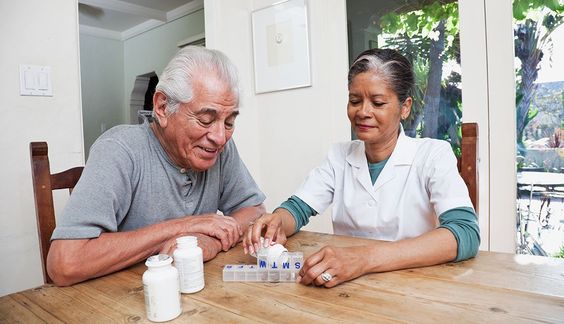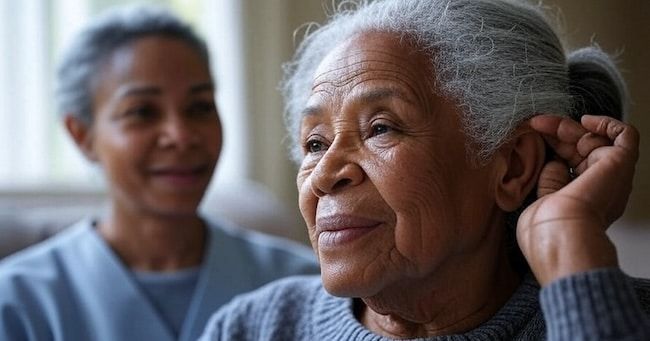Comfort and Familiarity: Home Is Where the Heart Is
Making the decision about care for a loved one is never easy. Assisted living facilities offer community and structure, but in-home personal care provides a unique blend of comfort, independence, and tailored support. Let’s take a closer look at why in-home care is often the better option for ensuring the well-being and happiness of your loved ones.
1. Comfort and Familiarity: Home Is Where the Heart Is
One of the most significant benefits of in-home care is the ability to remain in a familiar environment filled with cherished memories. A home is more than just a physical space—it's a source of comfort, security, and identity.
The Role of Environment in Emotional Well-being:
For seniors, especially those with cognitive challenges like dementia or Alzheimer’s, familiar surroundings can reduce confusion and anxiety. Personal belongings, family photos, favorite chairs, and even the scent of home all contribute to a sense of peace and well-being. Assisted living facilities, while designed to be comfortable, lack the personalization that home provides.
Real-Life Example:
Consider Mrs. Thompson, an 82-year-old woman who has lived in her home for over 50 years. Moving her to an assisted living facility meant leaving behind her garden, which she tended to daily, and the kitchen where she baked cookies for her grandchildren. Choosing in-home care allowed her to continue her beloved routines, contributing to her emotional stability and happiness.
Key Insight: The familiar environment of home can ease transitions and provide a sense of control, crucial for emotional health.
2. Personalized, One-on-One Care
In-home care offers something assisted living cannot: undivided, individualized attention. In assisted living facilities, caregivers are often responsible for multiple residents, which can limit the amount of personal interaction each person receives.
How Personalized Care Makes a Difference:
In-home caregivers focus entirely on the individual’s needs. Whether it’s helping with daily tasks, providing companionship, or assisting with medical care, the attention is tailored and responsive. This personal connection allows caregivers to understand subtle changes in health or behavior, providing early intervention when necessary.
Example of Tailored Support:
Imagine Mr. Johnson, a retired teacher with mobility issues. His caregiver understands his love for reading and ensures he always has a selection of new books. Additionally, the caregiver prepares meals that meet his dietary preferences and engages in meaningful conversation about education—a level of care not possible in a group setting.
Key Insight: Personalized care ensures that your loved one’s unique preferences and needs are met, fostering trust and better outcomes.
3. Greater Independence and Autonomy
Maintaining independence is crucial for an individual’s self-esteem and dignity. In-home care allows individuals to retain control over their daily lives in ways that assisted living cannot.
The Power of Choice and Routine:
In an assisted living facility, schedules for meals, activities, and even personal care are often predetermined. In contrast, in-home care allows individuals to wake up when they want, eat meals on their own schedule, and continue hobbies or routines without interruption.
A Story of Independence:
Take Mrs. Lewis, who loves to start her mornings with a quiet cup of tea on her porch. With in-home care, she continues this ritual daily, a simple act that reinforces her sense of autonomy. In an assisted living environment, such personal rituals are often sacrificed for the convenience of group schedules.
Key Insight: In-home care supports independence by allowing loved ones to maintain their routines, choices, and hobbies.

4. Customized Care Plans for Unique Needs
Unlike the one-size-fits-all approach of many assisted living facilities, in-home care offers fully customized care plans that adapt to evolving needs.
Adapting Care to the Individual:
Whether it’s managing a chronic illness like diabetes, providing mobility assistance, or ensuring proper medication administration, in-home care plans are as unique as the individuals they serve. Caregivers work closely with families and healthcare professionals to create dynamic plans that adjust as needs change.
Specialized Support in Action:
Mr. Ramirez, who recently underwent hip surgery, requires physical therapy and assistance with mobility. His in-home caregiver helps him with prescribed exercises, ensuring he recovers safely while remaining comfortable in his home. This level of customization ensures a faster recovery compared to the generalized care in assisted living facilities.
Key Insight: Customized care plans provide the flexibility to address specific medical and personal needs, ensuring comprehensive support.
5. Cost-Effective Care with Maximum Flexibility
Contrary to popular belief, in-home care can be a more economical option than assisted living, especially when care needs are not around the clock.
Breaking Down the Costs:
Assisted living facilities often charge a flat rate that includes services some individuals may not need. Additionally, hidden fees for specialized care, medication management, or additional services can quickly increase the cost. In-home care allows families to pay only for the services they need, whether it’s a few hours a day or 24/7 support.
Financial Flexibility in Practice:
Consider the Jones family, who needed part-time care for their father during the day while family members were at work. They were able to hire an in-home caregiver for just the hours they needed, saving thousands annually compared to the fixed costs of an assisted living facility.
Key Insight: In-home care offers a flexible, cost-effective solution tailored to specific care needs, helping families save money while providing high-quality support.

Conclusion: Why In-Home Care Is the Right Choice
Deciding on the best care for a loved one is one of the most emotional and impactful decisions a family can face. It goes beyond choosing where they will live—it’s about ensuring their happiness, dignity, and quality of life. In-home care stands out as a solution that offers more than just practical support; it provides an opportunity to maintain a sense of normalcy, purpose, and joy. Let’s explore the deeper reasons why it’s the right choice:
Emotional Well-Being Over Institutional Care
Home is a powerful symbol of comfort and security. The memories created in familiar surroundings—family gatherings, holidays, and everyday moments—form an emotional anchor that keeps seniors connected to their past and present. Assisted living, while offering structure, can feel impersonal and institutional. The emotional toll of leaving one’s home can be significant, often leading to feelings of isolation, depression, or anxiety. In contrast, in-home care ensures that your loved one remains surrounded by the warmth of their own space, fostering a sense of continuity and belonging.
Final Reflection: Care with Compassion and Connection
In-home care is more than just a service—it’s a commitment to honoring the individuality and dignity of your loved one. It allows them to live life on their terms, in the place they love, surrounded by memories and comforts that no facility can replicate. For families, it’s a way to ensure that their loved ones receive the care they need without compromising their happiness or sense of self. Choosing in-home care is choosing compassion, connection, and a higher standard of care.
Call to Action:
If you’re ready to explore how in-home care can enhance your loved one’s life, contact Charlies Angels For Hire today for a free consultation. Let us show you how personalized, compassionate care can provide the peace of mind you deserve.
You might also like
CHARLIES ANGELS BLOG




